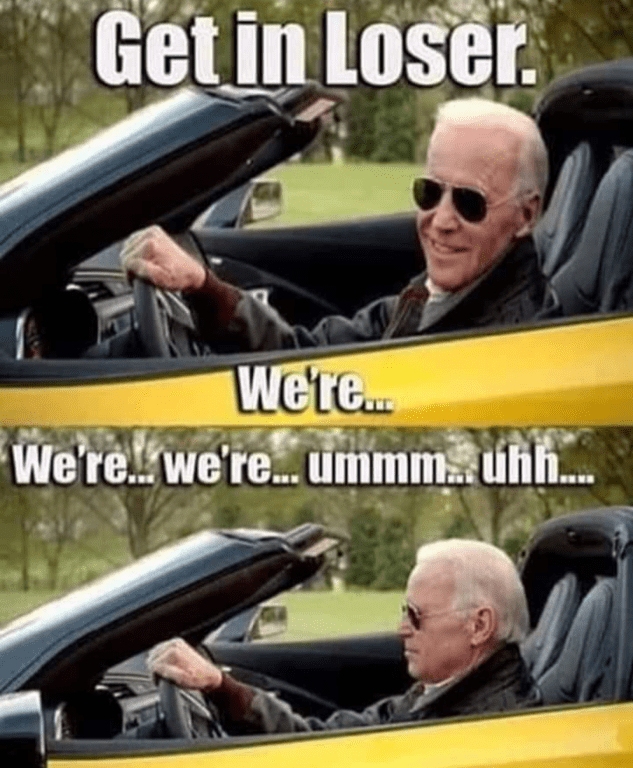The phrase "get in loser" has become a widely recognized cultural reference that resonates across generations. It originated from a memorable scene in the classic movie "Mean Girls," but its impact extends far beyond the silver screen. This phrase has been adopted into everyday language and pop culture, making it an intriguing subject to explore.
While the phrase may seem simple on the surface, its meaning and implications are layered. It reflects themes of social dynamics, humor, and the power of language in shaping cultural narratives. In this article, we will delve into the origins of "get in loser," its significance, and how it continues to influence modern culture.
By the end of this article, you will have a comprehensive understanding of why "get in loser" has stood the test of time and how it continues to be relevant in today's world. Let's dive in and explore the fascinating story behind this iconic phrase.
Read also:Discovering The Inspirational Legacy Of Marie N Feagins
Table of Contents
- The Origin of "Get in Loser"
- Cultural Impact of "Get in Loser"
- Why "Get in Loser" Became Popular
- The Role of "Mean Girls" in Popularizing the Phrase
- Parodies and Memes Inspired by "Get in Loser"
- Psychological Insights Behind the Phrase
- Modern Usage of "Get in Loser"
- "Get in Loser" in the Business Context
- Future Perspective of the Phrase
- Conclusion
The Origin of "Get in Loser"
The phrase "get in loser, we're going shopping" was first introduced in the 2004 film "Mean Girls," written by Tina Fey. The movie, which revolves around high school social dynamics, features a scene where the character Regina George sarcastically invites Cady Heron into her car using this now-iconic line. This moment became a defining scene for the film and launched the phrase into the public consciousness.
According to the movie's director, Mark Waters, the line was crafted to highlight the character's condescending attitude while simultaneously being humorous. The phrase gained traction because it encapsulated the essence of teenage sarcasm and the complexity of friendships in high school.
Despite its seemingly negative connotation, the phrase has been embraced by audiences worldwide. Its ability to evoke laughter and resonate with viewers has made it a timeless piece of dialogue in film history.
Cultural Impact of "Get in Loser"
The cultural impact of "get in loser" cannot be overstated. It has transcended its original context and become a part of everyday language. People often use the phrase humorously in situations that involve sarcasm, invitations, or even self-deprecation.
Some key aspects of its cultural impact include:
- Its inclusion in various memes and internet jokes.
- Its use in pop culture references, including TV shows, music, and advertisements.
- Its ability to connect people across different age groups and backgrounds.
The phrase's adaptability is one of the reasons it remains relevant today. Whether used in a serious or playful context, "get in loser" continues to spark conversations and bring people together.
Read also:How Tall Is Understanding Height Measurements And Their Importance
Why "Get in Loser" Became Popular
Relatability
One of the primary reasons "get in loser" became so popular is its relatability. High school experiences are universal, and the phrase taps into the shared memories of many individuals. The sarcasm and humor associated with the line resonate with people who have experienced similar social dynamics.
Comedy and Timing
The comedic timing of the scene in "Mean Girls" plays a significant role in the phrase's popularity. Tina Fey's sharp wit and the actors' performances make the line unforgettable. The combination of humor and social commentary creates a lasting impression on viewers.
Furthermore, the phrase's adaptability allows it to be used in various contexts, making it versatile and enduring.
The Role of "Mean Girls" in Popularizing the Phrase
"Mean Girls" is widely regarded as one of the most influential teen movies of the 2000s. The film's exploration of high school cliques and social hierarchies struck a chord with audiences. The phrase "get in loser" became synonymous with the movie's impact and legacy.
Tina Fey's writing and the strong performances by the cast elevated the film's status, ensuring that lines like "get in loser" would remain etched in popular culture. The movie's success at the box office and its enduring popularity on streaming platforms further cemented its place in history.
Parodies and Memes Inspired by "Get in Loser"
Over the years, "get in loser" has inspired countless parodies and memes. Social media platforms like Twitter, Instagram, and TikTok have been instrumental in spreading these creations. Fans of the movie have reimagined the line in various contexts, from political commentary to everyday situations.
Examples of popular memes include:
- Recreating the car scene with different characters or scenarios.
- Using the phrase in unexpected contexts, such as historical events or celebrity news.
- Combining the line with other cultural references to create hybrid memes.
These creative adaptations have kept the phrase relevant and engaging for new audiences.
Psychological Insights Behind the Phrase
From a psychological perspective, "get in loser" reflects the complexity of human interactions. It highlights the tension between sarcasm and genuine invitations, showcasing how language can convey multiple meanings simultaneously.
Key psychological insights include:
- The use of sarcasm as a social tool to establish hierarchy or diffuse tension.
- The role of humor in breaking down barriers and fostering connections.
- The impact of language on self-perception and social identity.
Understanding these dynamics helps explain why the phrase resonates so deeply with people and continues to be a source of fascination.
Modern Usage of "Get in Loser"
In today's digital age, "get in loser" has taken on new meanings and applications. It is frequently used in online conversations, social media posts, and even marketing campaigns. Brands have capitalized on the phrase's popularity by incorporating it into their messaging strategies.
Modern usage examples include:
- Companies using the phrase in advertisements to appeal to younger audiences.
- Individuals sharing memes or videos featuring the line to express humor or sarcasm.
- Public figures referencing the phrase in interviews or public appearances.
This adaptability ensures that "get in loser" remains a relevant part of contemporary culture.
"Get in Loser" in the Business Context
Businesses have also embraced "get in loser" as a way to connect with their target audience. By incorporating the phrase into marketing campaigns, companies can tap into the nostalgia and humor associated with it. This approach helps build brand loyalty and engagement.
Key strategies for businesses include:
- Using the phrase in social media campaigns to increase reach and engagement.
- Creating merchandise or promotional materials featuring the line.
- Partnering with influencers who can effectively incorporate the phrase into their content.
By leveraging the cultural significance of "get in loser," businesses can create meaningful connections with their customers.
Future Perspective of the Phrase
Looking ahead, "get in loser" is likely to remain a staple of pop culture. As new generations discover "Mean Girls" and its iconic scenes, the phrase will continue to find relevance in various contexts. Its adaptability and humor ensure that it will be embraced by future audiences.
Moreover, advancements in technology and social media will provide new platforms for the phrase to evolve and thrive. Whether through virtual reality experiences or augmented reality applications, "get in loser" will undoubtedly find innovative ways to stay current.
Conclusion
In conclusion, "get in loser" is more than just a line from a movie. It is a cultural phenomenon that has left an indelible mark on society. From its origins in "Mean Girls" to its widespread usage today, the phrase continues to resonate with people across the globe.
We encourage readers to share their thoughts and experiences with "get in loser" in the comments section below. Additionally, feel free to explore other articles on our website that delve into similar topics. Together, let's celebrate the enduring legacy of this iconic phrase!


